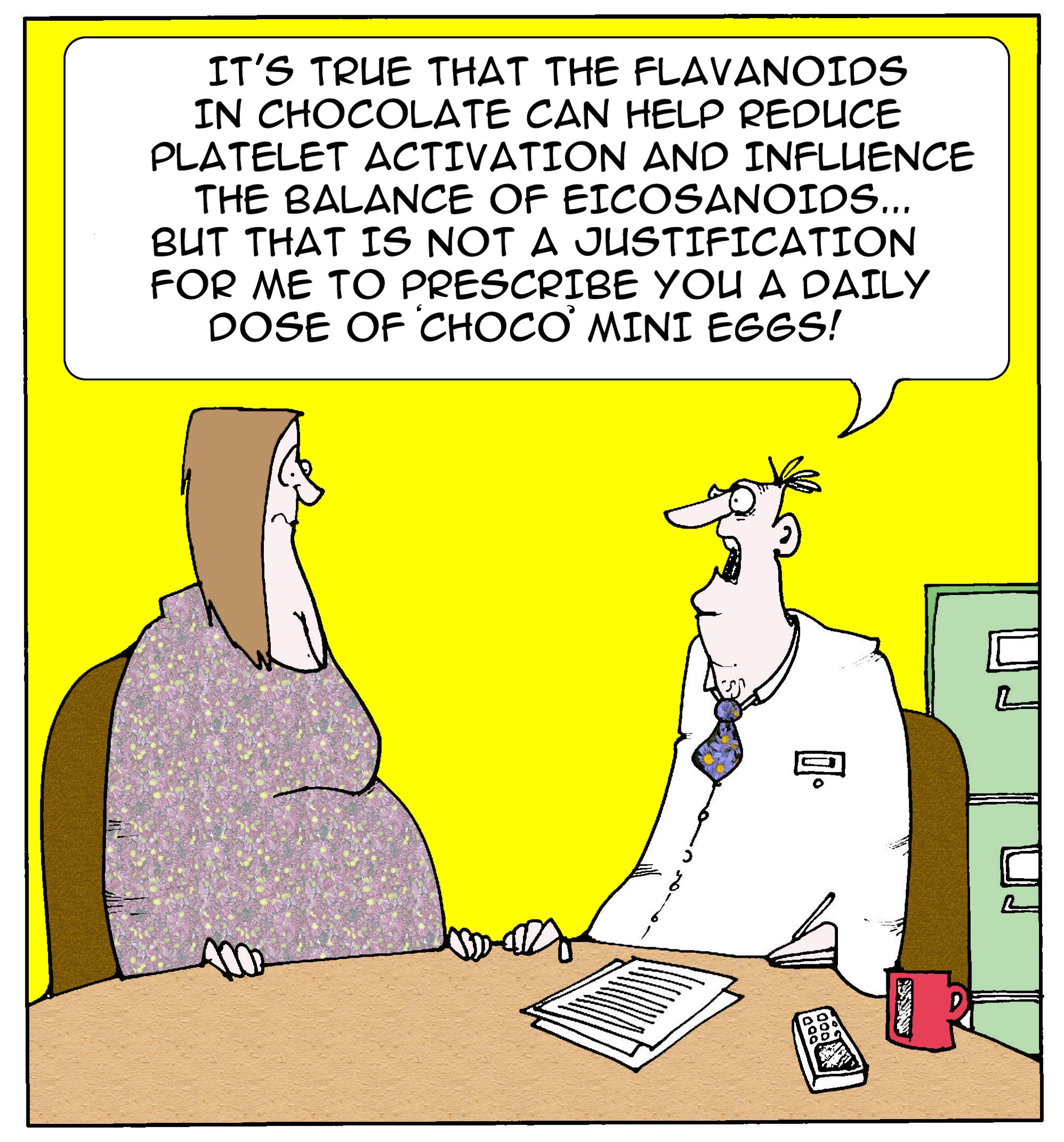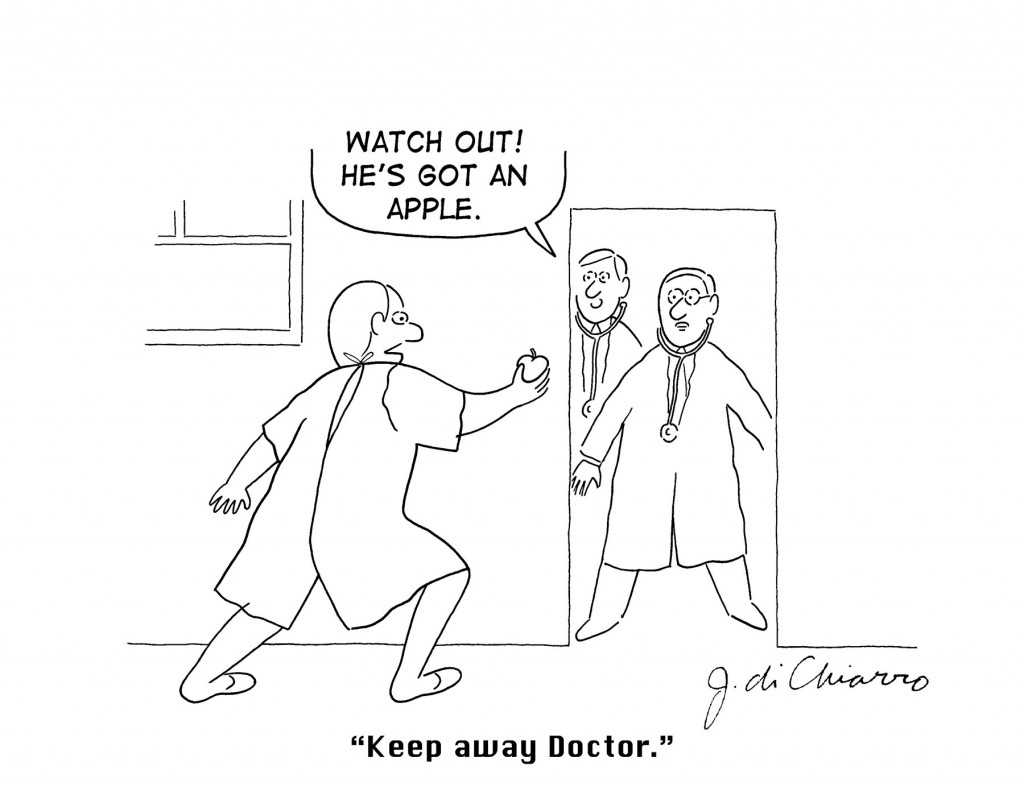An apple a day…
Do you recall last year’s post on the beneficial effects of dried plums (aka prunes) on bone health? Well, it appears that dried plums are not the only functional fruit in town. In fact, eating just 2.6 ounces of dried apple daily may protect your heart after menopause.
In this study (published in the August issue of the Journal of The Academy of Nutrition and Dietetics) researchers asked 160 postmenopausal women to eat dried apple or the nutritional equivalent (in terms of calories, fat, carbs, fiber and protein) of dried plums — 3.5 oz — daily for a year. At various time points during the study, levels of blood fats and cholesterol, physical activity and diet were measured. However, the women were asked to avoid taking any steps towards further altering their diets. None of them were on hormone therapy or taking cholesterol lowering drugs during and at least three months before the trial.
The findings are striking. Not only did women who ate dried apple drop 3 pounds, but by three months, their total cholesterol levels had decreased by 9% and LDL-cholesterol levels by 16%. By 6 months, these improvements increased to 13% and 24%, respectively. Moreover, the ratio of HDL to LDL cholesterol improved and C-reactive protein (a protein in the blood that responds to increases in inflammation) declined by 32 %. Women who ate dried plums also experienced improvements in these markers but not to the same dramatic extent.
Eating apples have been linked to improvements in body weight, blood fats, inflammation and other factors that contribute to heart disease. When dried, they are rich sources of soluble fiber and pectin and even suppress food intake, thereby leading to weight loss. Apples are also an excellent source of polyphenols — antioxidant-rich chemicals — that have also been shown to lowering heart disease risk.
Heart disease is a major problem in women and especially after menopause. There are numerous posts within Flashfree that explain the numerous factors that contribute to risk, including elevated cholesterol levels and weight gain. Dried apples represent a cost-saving alternative to statin drugs, which are frequently used to treated high cholesterol while also increasing the risk for muscle weakness and liver damage. Moreover, statins contribute to more than 3% of the total costs of heart disease in the U.S., which is pretty striking.
An apple a day? Sound advice, indeed!
Read More
Have a heart: low carb, high protein diets
This post will not be very popular amongst some people. And I apologize in advance for that. But I only share information that you may find useful; it’s up to you to decide how to use it.
Lately, there’s been a craze to consume diets high in protein and low in carbs in order to stave off weight and theoretically, certain diseases. But what if a diet out of balance is placing your heart at risk? That’s exactly what researchers are reporting in a large study of almost 44,000 Swedish women that was published this week in the open access British Medical Journal. You can find that study here. Mind you, the researchers caution that the findings don’t address whether or not there are benefits to eating such a diet in the short term. But this is what they do show:
- After examining questionnaires collected over a 15+ year period in this group of relatively young women (ages 30 to 49), they observed 1,270 heart events, including heart disease, stroke, hemorrhage and peripheral disease of the arteries.
- When they scored the diets based on protein or carb intake (with 1 being ‘very high’ and 10, ‘very low) or a mixed diet (with 2 associated with hi carb/lo protein and 20, every low carb and very high protein) they learned that a 1 point decline in intake of carbohydrates or 1 point increase in protein was associated with a 4% increase in heart events.
- Each 2 point increase in low carb/high protein diets (which is equivalent to a 5 gram increase in daily protein intake and a 20 gram decline in daily carbohydrate intake, was linked to a significant 5% increase in heart events. Moreover, these risks did not differ substantially among women whose protein intake primarily derived from animal or plant origin.
The researchers state that “vegetables, fruits, cereals and legumes, which have been found in several studies to be core components of healthy dietary patterns, are important sources of carbohydrates so reduced intake of these food groups is likely to have adverse effects on cardiovascular health,” adding that “several studies have reported that meat consumption or hight intake of protein from animal sources may increase the risk of cardiovascular disease.”
So, what’s the primary message here? Well, like any other study, nothing is definitive. And yet, we know that heart disease risk naturally increases as women age. Should you continue to ascribe to the low-carb/high-protein craze, you may want to pay extra attention to your heart health. You may look like a million bucks and your insulin levels may be fabulous but your heart may be struggling to keep up. Meanwhile? Concentrate on low fat animal proteins and try to stay with the 80-20 rule if you refuse to change your ways, i.e., 80% protein, 20% carbohydrates. Seriously? Have a heart.
Read MoreWednesday Bubble: Flashes and sweats and your heart
Be still my heart? Not this week. At least not as far as hot flashes and night sweats go. In fact, study findings that will be presented this coming weekend at the Endocrine Society ‘s 94th Annual Meeting suggest that hot flashes and night sweats that many women experience early in their menopause are not related to an increased risk for heart disease.
So what’s the 4-11?
Researchers have previously questioned whether or not timing of symptoms play a role in a woman’s increased risk for heart disease during menopause. They’ve found that experiencing symptoms only around the time menopause begins may actually reduce the risk for heart disease, or the risk of stroke, heart attack or death (compared with women who experience symptoms later). (If you’d like more about heart disease, aging and menopause, an archive of posts can be found here). To learn more, they have now analyzed the presence of markers in the body that have been linked to heart disease risk (e.g. high blood pressure, cholesterol, blood sugar, insulin, and specific blood markers that might indicate inflammation), in almost 60,000 women who were in menopause and had participated in the Women’s Health Initiative Observation Study.
These women were separated into groups, depending on the presence and timing of vasomotor symptoms:
1) No symptoms
2) Symptoms at start of menopause but not at the start of the study
3) Symptoms both at the start of menopause and the start of the study
4) Symptoms at the start of the study but not at the start of menopause
Importantly, women who had symptoms early in their menopause but not late did not appear to have elevated markers that may indicate heart disease risk. In comparison to this group, women whose vasomotor symptoms occurred only late in menopause appeared to have increased risk, mainly due to higher blood pressure and higher white blood cell counts. Those whose symptoms started early and persisted appeared to have higher levels of glucose and insulin, which indicated an increase in the risk for diabetes.
The researchers, who harken from Northwestern University, note that it’s unclear why timing of symptoms may influence heart disease, although the lead investigator, Dr. Emily D. Szmuilowicz has speculated that symptoms that occur long after menopause begin may indicated some sort of blood vessel abnormality. And while she and her colleagues have not suggested a strategy to attenuate this risk, it is clear that due diligence is needed. If your symptoms persist well into your menopause, see your health practitioner and ask him or her to run some tests. More importantly, hindsight is 20-20; be sure to instill lasting heart healthy habits early and maintain them while you age.
Read More
No time like a present: heart disease, metabolic syndrome and weight
Want to give yourself the gift of a lifetime? Aim for a healthy weight before you hit menopause.
We’ve discussed it time and again on Flashfree; weight gain and menopause go hand in hand like a horse and carriage. And with that weight gains comes an increased risk for developing heart disease, diabetes and the dreaded metabolic syndrome. However, researchers from the University of Ottawa are reporting that entering full menopause with a healthy body mass index (BMI) actually confers protection.
In the study (which appeared online a few weeks ago in the journal Menopause), researchers evaluated and observed 102 premenopausal women for body composition and changes in their cardiovascular health profiles. The women, all of whom were between 47 and 55 years of age, did not smoke, had a BMI between 20 and 29 and had had a stable weight for at least 6 months before the study started, were followed for five years. Each year, the researchers gauged if they had entered menopause, measured body composition (i.e. total fat mass, trunk fat mass and total fat free mass), waist size, the degree of abdominal fat and took blood to examine glucose, insulin and blood fat levels.
The study’s lead researcher, Dr. Denis Prud-homme explains that by simply observing the women and not imposing any structured interventions (e.g. diet or exercise) they were able to assess changes within a more naturalistic environment. At the study’s end, they discovered that despite significant increases in fat mass, visceral abdominal fat, blood glucose and cholesterol levels, most of which were the natural result of hormone fluctuations and aging, the women did not appear to have any declines in their heart or metabolic profiles that would indicate an increased risk for disease. Dr. Prud-homme says that a possible explanation might be that “even if the area of visceral fat is increased, it is still under the critical threshold associated with cardio-metabolic deterioration.” In other words, by maintaing a healthy lifestyle and BMI premenopausally, these women were able to change their risk equations once they fully entered menopause.
The bottom line is that the present you give yourself now will last long into your later years. Exercise. Eat right. And pay attention to your health.
No time like the present. For a present. Give yourself one.
Read MoreLoco for cocoa – chocolate and your heart
 Last June and August, I wrote about the link between eating chocolate and improving heart health. Briefly, researchers have long been interested in flavonoids and in particular (at least in so far as menopause goes) in isoflavones. (See soy posts for more on isoflavones). The specific compound or molecule of interest in cocoa (the non-fat component cocoa bean extract or liquor) are flavanols, which are also found in lower concentration in apricots, peaches, apples, green and black tea, red wine and cider). Note that the quantity of flavanols in chocolate depends on manufacturing, including fermentation and roasting, and how much treatment is given to reducing bitterness and improving consistency. What this means is that dark chocolate has the highest concentration of flavanols and milk, the lowest.
Last June and August, I wrote about the link between eating chocolate and improving heart health. Briefly, researchers have long been interested in flavonoids and in particular (at least in so far as menopause goes) in isoflavones. (See soy posts for more on isoflavones). The specific compound or molecule of interest in cocoa (the non-fat component cocoa bean extract or liquor) are flavanols, which are also found in lower concentration in apricots, peaches, apples, green and black tea, red wine and cider). Note that the quantity of flavanols in chocolate depends on manufacturing, including fermentation and roasting, and how much treatment is given to reducing bitterness and improving consistency. What this means is that dark chocolate has the highest concentration of flavanols and milk, the lowest.
What have researchers learned so far?
- Flavanols found in cocoa and cocoa powder may be powerful antioxidants and as such, help to mitigate certain factors that contribute to atherosclerosis, such as the formation of plaques in the arteries that lead to stroke and other coronary events. Thus, as antioxidants, they may actually neutralize toxic oxygen species circulating in the bloodstream.
- Experimental data suggest that ingestion of flavanols may help to regulate proteins and other compounds that encourage an inflammatory response to leads to heart disease.
- Flavanols may also help to stabilize the lining and muscular tone of the arteries and prevent them from narrowing.
- Additionally, flavanols may moderately protect against high blood pressures, although studies have been mixed.
- Finally, flavanols may help to maintain blood sugar levels and improve the ratio of good to bad fats in the blood.
However, while numerous studies suggest that chocolate may benefit the heart, less clear is whether or not a causal relationship exists. Still, the idea is attractive enough that researchers continue to delve into the potential benefits of functional foods containing flavonoids and in flavonols found in dark chocolate. This time, writing in the journal Appetite, they report on a newly published study that examined the effect of eating flavonoid-rich dark chocolate on a process called oxidative stress, in which the ratio of circulating oxygen free radicals to circulating antioxidants is imbalanced (free radicals are those nasty, unstable molecules or atoms that can wreak havoc and lead to disease, including heart disease, diabetes and high cholesterol).
Over a period of three weeks, 25 healthy men and women were asked to eat 50 g of dark chocolate daily. The women in this particular study were premenopausal, primarily because use of hormone replacement has been shown to modify oxidative stress that has been attributed specifically to LDL (low density lipoprotein, also known as the bad cholesterol). They also omitted any other cocoa products from their diet and tea, red wine and other drinks that were rich in antioxidants.
Not only did eating dark chocolate daily have no impact on body mass index or the subjects’ weight, but it significantly increased the percentage of HDL (high density lipoprotein or good cholesterol) and led to a significant declines in blood fats levels as well. Dark chocolate consumption also appeared to lower markers of oxidative stress and damage to good fats in cells by almost 27% in women in the study, indicating a favorable effect on LDL, a change that was not similarly observed in men. This suggests that eating dark chocolate could possibly benefit women more than men, at least in terms of the heart. And, while menopausal women were not studied, the researchers say that the protective role of dark chocolate could possibly be especially favorable during menopause, when waning levels of estrogen make women particularly sensitive to oxidative damage and heart disease.
As with similar studies, we still don’t have a definitive cause and effect. However, a little dark chocolate has the potential to go a very long way.
Read More










